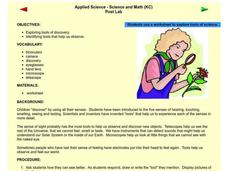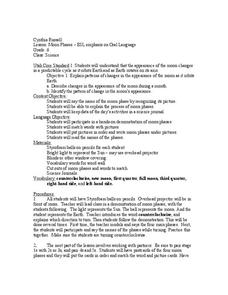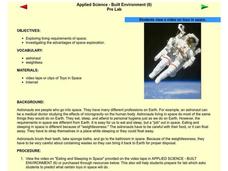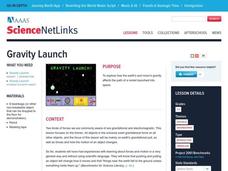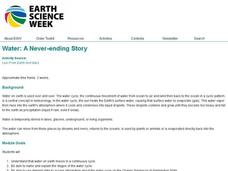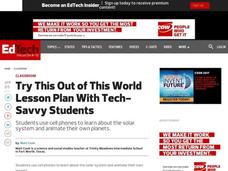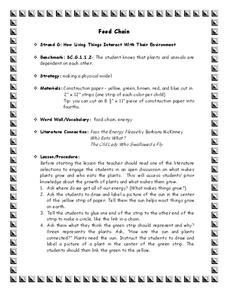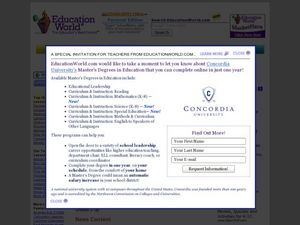Curated OER
Pond Ecosystem Field Trip
Young scholars investigate the environment by participating in a class trip. In this pond ecosystem lesson, students define a list of vocabulary terms associated with ponds such as invertebrate and metamorphosis. Young scholars attend a...
Curated OER
Applied Science - Science and Math Post-Lab
Students use scientific tools. In this Applied Science instructional activity, students investigate the use of scientific tools to enhance observation and discovery. Students indicate how each tool assists scientific work.
Curated OER
Earth Epochs
Pupils explore earth epochs, i.e, Permian, Precambrian, Cambrian, Ordivician and through pictures they see what life on Earth and animals looked like. They organize Earth Epochs according to years going from greatest to least...
Virginia Department of Education
Igneous Rocks
High schoolers explore igneous rocks by observing rock samples and considering cooling rates and composition. The third installment of a five-part geology series culminates in an activity where learners use igneous rock...
Virginia Department of Education
Metamorphic Rocks
Rocks can bend? Pupils investigate how heat and pressure produce metamorphic rocks by modeling them using clay, and then categorize samples based on observable characteristics. The lesson ends with a metamorphic rock identification...
Curated OER
Moon Phases
Sixth graders investigate the phases of the moon. In this moon phase lesson, 6th graders discover that the moon changes in a cycle as it orbits Earth. Students label pictures of moon phases and keep a moon phase journal. Students...
Curated OER
Growth of a River
Learners evaluate geography by drawing an image in class. In this river lesson, students identify a list of vocabulary terms associated with bodies of water. Learners identify how a river is formed and draw a picture of one including the...
Curated OER
Living in Space
Students explore space science by viewing a video in class. In this astronaut lesson, students identify the living habits of astronauts by researching the NASA website and observing a space science video in class. Students participate in...
Curated OER
Why Do We Have Night?
Young scholars engage in a fun, creative way to discover how the Earth moves. This lesson helps students explain why there is day and night. It can also create curiosity to further study the solar system and eclipses!
Curated OER
Tornadoes
Young scholars examine the characteristics of a tornado. They practice using new vocabulary and participate in a question and answer session. They use the internet to gather more specific information.
Curated OER
Where in the World Is All the Water?
Students investigate the distribution of the earth's water. They conduct a demonstration of water distribution, and create a pie graph to display the results.
Curated OER
Gravity Launch
Students examine how gravity affects launching rockets into space. In this physical science instructional activity, students review the concept of gravity and use an interactive online site, "Gravity Launch," to simulate a rocket launch.
Curated OER
Stream Ecology In Wisconsin and Puerto Rico
Students identify the different types of water and explain in what proportions they exist on Earth. They identify and correctly label the parts of the water cycle and how these parts interact with each other. Students identify the...
Curated OER
Water: A Neverending Story
Students investigate the water cycle. In this water cycle science lesson, students participate in a series of activities that demonstrate evaporation, precipitation, and condensation. Students describe their observations using...
Curated OER
Out of This World
Fifth graders animate their own planets. In this solar system lesson, 5th graders use smartphones and the software, GoKnow Sketchy, to create images for presentations on their created planets that appear to be animated when played...
Curated OER
Introduction to the Day and Night Sky
Students explore space science by participating in a sky observation activity. In this astronomy lesson, students define a list of astronomy vocabulary terms and examine star charts of the four seasons. Students gather with their...
Curated OER
Water Cycle: Mobius Strip
Students describe the water cycle and create a Mobius strip model. They determine that the weathering of rocks continually adds sodium to the Earth's rivers and subsequently to the oceans. They discuss the fact that the water on Earth...
Curated OER
Reflecting on Reflectivity
Students plan and construct a "mini-lab" to measure the reflectivity of different earth surfaces. They measure reflectivity of materials, including ice, soil, rocks, etc., and then extrapolate from what they have learned to consider the...
Curated OER
School Lighting Audit Preparation
Students work together to develop a school lighting audit plan. They practice using new vocabulary related to an energy audit. They also identify the components of a school lighting audit.
Curated OER
Modeling the Change of Seasons
Students evaluate data to determine changes in length of day. They model the revolution of Earth around the sun to show changes in length of day and sun angle and illustrate how the sun angle affects the change of season.
Curated OER
Dinosaurs Here Yesterday Gone Today
Learners take a pre-test to show their prior knowledge of dinosaurs. Using the internet, they reasearch the time period in which they roamed the Earth. Focusing on the area of Connecticut, they compare and contrast the large and small...
Curated OER
People Change the Landscape
Students examine ways in which humans have brought change to the natural environment. In this ecology and literacy lesson, students listen to the book Island Boy by Barbara Cooney. Students observe and define map-reading vocabulary as...
Curated OER
Food Chain
Students discuss what makes plants grow and who eats the plants. They are asked where do we get all of our energy? Students are asked to draw and label a picture of the sun in the center of the yellow strip of paper. They are explained...
Curated OER
Teacher-Astronaut Offers New Lessons
Students read about teacher-in-space Barbara Morgan and life in space. In this space science and current event lesson, the teacher introduces the article with a vocabulary activity, then students read the news piece and participate in a...



